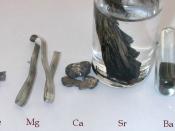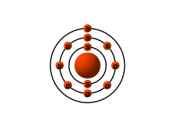Introduction
The three series of elements situated in the periodic table following the alkaline earth metals are described as transition metal; this term is sometime extended to include the lanthanide and actinide elements.
There position in the periodic table is between the s-block and p-block elements, their properties are transitional between the highly reactive metallic elements in the s-block, which typically form ionic compounds, and the elements of the p-block, which are largely covalent. In the s- and p-block electrons are added to the outer shell of the atom, in the d-block electrons are added to the penultimate shell explaining from 8 to 18 electrons. The transitional elements typically have an incompletely filled d level however, in group 12 (the zinc group) has a d10 configuration, an complete d shell, compounds of these elements are not typical and show some difference from the other in the series.
They exhibit a number of characteristic properties, which distinguish them from other groups of elements:
1) They are all metals and as such are lustrous and deformable and have high electrical and thermal conductivities, in addition their melting and boiling points tends to be high and they are generally hard and strong and from alloys with other metals.
2) Most of them display numerous oxidation states, which vary by step of 1 rather than 2 as is usually the case with those main-group elements, which exhibit more than one oxidation state
The oxidation state shown by the transition elements maybe related to t`eir electronic structure, i.e. Calcium-block element preceding the first row transition elements has the electronic structure:
Ca 1s 2 2s 2 2p 6 3s 2 3 p6 4s 2
It might expected that the next ten transitional elements would follow this trend of electronic configuration, this is true, except for Cr...


